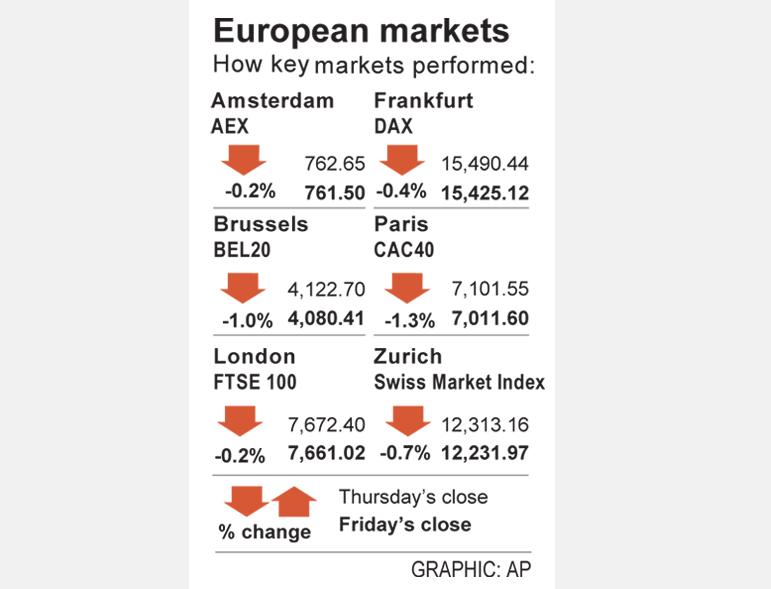Losses in technology stocks dragged European shares down on Friday, after red-hot US inflation drove up bond yields, although a positive earnings season and strong commodity prices helped the STOXX 600 log its first weekly gain this year.
The pan-European STOXX 600 index closed 0.59 percent lower at 469.57, but added 1.61 percent for the week, its best weekly showing since late December last year.
Tech stocks fell 2.2 percent, the most among their peers on Friday. The sector, along with utilities, was among the worst performers this week, under pressure from elevated debt yields.

Bond yields spiked after data showed that US inflation jumped this month, while hawkish comments from US Federal Reserve officials also raised expectations for a sharp rate hike next month.
“Strong quarterly earnings in Europe could dampen the sell-off, but until fears about a more aggressive response from the FOMC [US Federal Open Market Committee] dissipate, markets will remain under pressure,” Equiti Capital head macro economist Stuart Cole said.
However, “the Fed will do everything it can to avoid spooking the market ... akin to what we saw last month, and that means treading carefully,” Cole added.
European bond yields retreated after sharp gains on Thursday.
European Central Bank (ECB) President Christine Lagarde said that raising the ECB’s main interest rate now would not bring down record-high eurozone inflation and only hurt the economy.
Meanwhile, the German Association of German Chambers of Industry and Commerce on Friday cut its growth forecast for this year for Europe’s biggest economy to 3 percent from the 3.6 percent it had predicted in October last year, due to rising energy prices, raw material shortages and a lack of skilled workers.
Travel and leisure stocks were the best performers this week, up 7.4 percent on optimism about the easing of mask mandates in some US states.
Heavyweight mining stocks were also among the top performers this week, as expectations of improving demand in China drove up commodity prices.
In the UK, the blue-chip FTSE 100 slipped 0.15 percent to 7,661.02, but gained 1.92 percent from a week earlier.
The FTSE 100 has outperformed the STOXX 600 index this year, thanks to its heavy weighting toward banking and commodity stocks.
Britain’s economy shrank by a less-than-expected 0.2 percent in December, suggesting that — despite setbacks caused by the Omicron variant of SARS-CoV-2 — GDP grew well across the fourth quarter, data showed.
“The last month of the year wasn’t all doom and gloom ... and looking over the last quarter as a whole, there’s plenty to be positive about,” AJ Bell financial analyst Danni Hewson said.
The question now is whether this year would see the UK shake off December’s blip or whether supply constraints and rising prices would keep a lid on household consumption, which has been a key factor in GDP growth, Hewson added.

Taiwan will prioritize the development of silicon photonics by taking advantage of its strength in the semiconductor industry to build another shield to protect the local economy, National Development Council (NDC) Minister Paul Liu (劉鏡清) said yesterday. Speaking at a meeting of the legislature’s Economics Committee, Liu said Taiwan already has the artificial intelligence (AI) industry as a shield, after the semiconductor industry, to safeguard the country, and is looking at new unique fields to build more economic shields. While Taiwan will further strengthen its existing shields, over the longer term, the country is determined to focus on such potential segments as

UNCERTAINTY: Innolux activated a stringent supply chain management mechanism, as it did during the COVID-19 pandemic, to ensure optimal inventory levels for customers Flat-panel display makers AUO Corp (友達) and Innolux Corp (群創) yesterday said that about 12 to 20 percent of their display business is at risk of potential US tariffs and that they would relocate production or shipment destinations to mitigate the levies’ effects. US tariffs would have a direct impact of US$200 million on AUO’s revenue, company chairman Paul Peng (彭雙浪) told reporters on the sidelines of the Touch Taiwan trade show in Taipei yesterday. That would make up about 12 percent of the company’s overall revenue. To cope with the tariff uncertainty, AUO plans to allocate its production to manufacturing facilities in

COLLABORATION: Given Taiwan’s key position in global supply chains, the US firm is discussing strategies with local partners and clients to deal with global uncertainties Advanced Micro Devices Inc (AMD) yesterday said it is meeting with local ecosystem partners, including Taiwan Semiconductor Manufacturing Co (TSMC, 台積電), to discuss strategies, including long-term manufacturing, to navigate uncertainties such as US tariffs, as Taiwan occupies an important position in global supply chains. AMD chief executive officer Lisa Su (蘇姿丰) told reporters that Taiwan is an important part of the chip designer’s ecosystem and she is discussing with partners and customers in Taiwan to forge strong collaborations on different areas during this critical period. AMD has just become the first artificial-intelligence (AI) server chip customer of TSMC to utilize its advanced

While China’s leaders use their economic and political might to fight US President Donald Trump’s trade war “to the end,” its army of social media soldiers are embarking on a more humorous campaign online. Trump’s tariff blitz has seen Washington and Beijing impose eye-watering duties on imports from the other, fanning a standoff between the economic superpowers that has sparked global recession fears and sent markets into a tailspin. Trump says his policy is a response to years of being “ripped off” by other countries and aims to bring manufacturing to the US, forcing companies to employ US workers. However, China’s online warriors